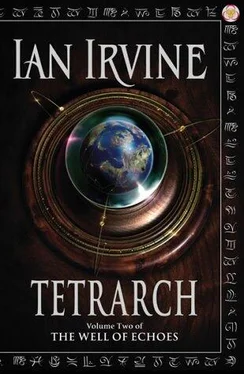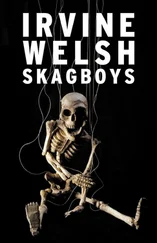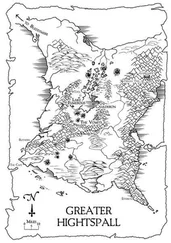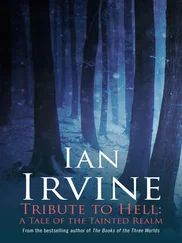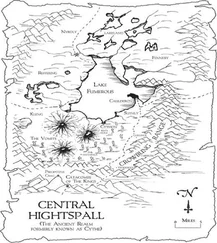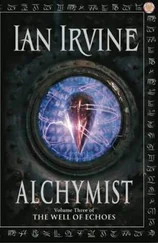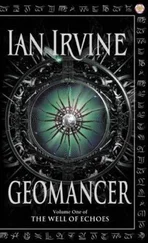‘Those rules don’t apply any more,’ his father said in a low voice.
‘Just look at the poor man! He’s got wounds everywhere but it hasn’t stopped him .’
Both mother and father bent down, inspected Nish, then stood up again.
‘Of course you can’t denounce him,’ said Colm’s mother. ‘That would also attract attention.’
‘We have to,’ said the father.
‘He’s not much more than a boy,’ muttered the mother. ‘He doesn’t even have a proper beard.’
‘Tell him to go, boy,’ said Colm’s father.
‘I won’t betray him. You tell him.’
Again Nish heard a slap, but thankfully Colm remained defiant.
‘If he is a perquisitor’s son,’ the mother quavered, ‘and on scrutator’s work, to refuse him will mean our deaths.’
A metal cover-plate was knocked off the bench. The father’s face appeared in front of Nish. The mother and son closed up on either side. ‘What business?’
‘I can’t tell you, but I carry information vital to the war. I must find a way to escape and meet a querist or perquisitor. Or failing that, an officer in the army.’
‘Very well,’ said the father. ‘I know my duty. We will be leaving shortly to go back to our quarters for the night. When I give the signal, come out between me and Colm. Walk carefully, looking down. Show me your hand.’
Nish held it out and the man examined the bloody scratches. ‘It may do, if they don’t look too closely. We have no friends here, but people know us, and in this camp anyone will betray their neighbour for an extra bowl of fishhead soup.’
The call came. Nish ducked out from under the bench and stood up between Colm and his father, who was a big man, nearly a head taller than Nish. He took a sideways glance. The building had three aisles and a line of people was forming along each of them. There would have been hundreds. Most were as haggard, thin and dirty as the boy. Few looked anywhere but at the earth floor.
The line crept forward. Nish felt a fluttering in his stomach. He had saved himself several times, by his own initiative, assisted by a generous helping of good fortune. Fortune could turn against him just as swiftly, and then he would die.
They approached the door, where each of the workers was delivered a dollop of gruel into their mug, and a slab of black bread. Nish had no mug. He was going to fall at the first hurdle. Panic told him to run but he fought it. He looked back. The father had realised the problem but did not know what to do about it. Nish was going to be discovered with the family and they would all be punished.
It was too late to get out of the way; they were only half a dozen places from the end of the line. Nish leaned forward. ‘I’ve no mug,’ he whispered in Colm’s ear.
Colm passed his own back, picked up a fragment of metal lying on the bench and, with an unobtrusive flick, sent it flying down the row. It struck a hairy man on his protruding ear. He whirled and swung a blow at the man behind him, who struck back.
The fellow serving the slops came out from behind his bench, flailing at the struggling men with his wooden ladle. Colm snatched a mug from the back of the bench and held it out.
The fight was over quickly. No one wanted to attract the attention of the guards outside. The line paced by, Nish received his ration of slops and his lump of bread, the serving man taking no notice of him, and then they were through the door.
He passed the guards and was halfway across the yard when one yelled, ‘Hey you!’
Nish froze, whereupon a hard hand went down on his shoulder and squeezed. ‘Keep going. Don’t look around.’
Nish did as he was told, expecting the soldiers to come running after him, but no one did. As he rounded the corner he saw, out of the corner of his eye, an unfortunate fellow being beaten between three laughing guards.
‘It’s their game,’ said the father. ‘Some poor wretch always turns around, and then they beat him for it.’
It took an anxious ten minutes to cross through the labyrinth of huts, shacks and hovels to the dismal space Colm and his family called home. Built from scraps of timber and canvas, chinked in with grass and mud, it was meaner than the hut of any primitive tribesman.
Inside it was barely long enough for the father to lie down. The earth floor was covered in bracken and reeds. The walls were hand-smeared mud, the roof a piece of rotting canvas smaller than a single bedsheet. They had nothing else in the world.
Two girls crouched within. The older, who might have been fifteen, was a small, unattractive creature, her hair positively dripping grease, her face full of spots and scars, and her teeth horrible black stumps. The younger, no more than five, was pretty, with wavy chestnut hair and green eyes.
‘This is Cryl-Nish Hlar,’ said the father, whose name was given as Oinan. ‘He is an important man. He will stay with us for a little while and we are going to look after him. No one will ever mention his name. Cryl-Nish, this is my wife Tinketil, my older daughter, Ketila, and my other daughter, Fransi.’
Ketila hid her face, and a flush crept up her throat. Poor girl, Nish thought, to suffer such a handicap, especially when her sister is such a beauty. He shook hands with Oinan, with Tinketil and with a solemn, staring Fransi. Ketila would not look at him. Her hands fluttered over her mouth.
‘Ketila,’ said Oinan sternly.
Putting one hand behind her back, she held out the other. Nish took it and she gave him a little shy smile that went all the way up to her eyes. It revealed perfect white teeth, and it quite transformed her. She must have been wearing something in her mouth to make them look so horrible. Perhaps the spots and the scars were fake too.
‘Teeth, Kettie!’ snapped Oinan.
‘They hurt, father,’ Ketila said, soft and pleading.
‘Oh, let her be,’ said the mother. ‘Have you no brains at all, husband? She can put them back if anyone comes.’
Tinketil boiled a tin mug of water over a handful of roots, cleaned Nish’s wounds and covered them with precious lard.
The parents said no more about Nish, nor spoke to him either. After a while Ketila and Fransi settled on the bracken against the far wall. Nish lay on his side facing the entrance. Oinan and Tinketil whispered to each other for a long while, a furious argument for all that they spoke so softly. Nish did not catch a word of it and finally he slept.
He was woken before dawn by a flickering light at the back of the hut. Tinketil was kneeling in front of Ketila, applying the spots to her face with a clump of hair glued into the split end of a twig. The smaller girl was still asleep. Oinan was not there.
Shortly he reappeared, carrying his dinner mug. ‘Hold out your hand, Cryl-Nish.’
Nish did as he was told and Oinan applied white powder to the back with a spoon, tracing out the pattern Colm had scratched the previous day. The mixture immediately began to burn and Nish had to grit his teeth.
‘It only takes a few minutes,’ the man said.
They were all staring at him. He wanted to weep with the pain, but they had gone through it and so could he. He counted down the seconds, then Oinan washed the quicklime off. It had taken most of the skin with it, leaving raw, weeping flesh.
‘You’re one of us now,’ said Oinan.
A gong sounded and everyone hurried to their workhouses. So the day passed, much as the previous one had, except that Nish now had to work. Like everyone else, he was required to assemble the clockwork mechanisms, and for all his years of artificing Nish proved the slowest of all.
Back in the hut that night, as Tinketil mended a shirt by the light of a pithy reed smeared with rancid fat, Nish became aware that Ketila was watching him, though every time he looked in her direction she glanced away. She had washed her face and tied back her hair. She was not as beautiful as Fransi, but she was charmingly fresh and lovely, and Nish liked her.
Читать дальше
